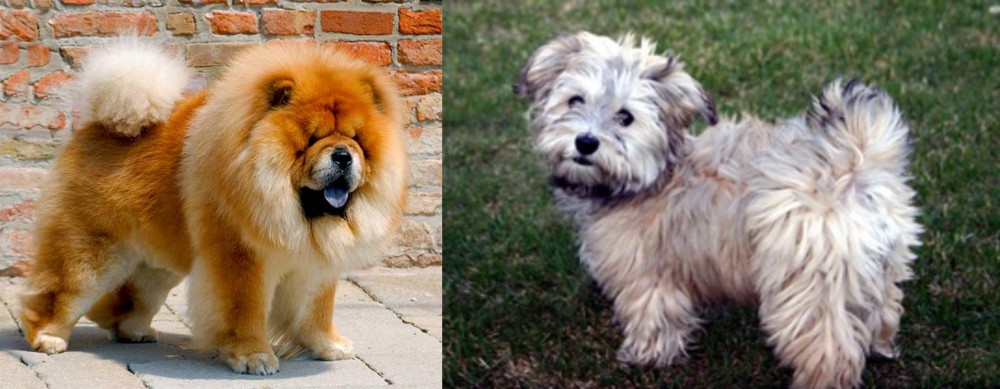 Chow Chow is originated from China but Havapoo is originated from United States. Chow Chow may grow 13 cm / 6 inches higher than Havapoo. Chow Chow may weigh 20 kg / 45 pounds more than Havapoo. Both Chow Chow and Havapoo has almost same life span. Both Chow Chow and Havapoo has almost same litter size. Chow Chow requires High Maintenance. But Havapoo requires Moderate Maintenance
Chow Chow is originated from China but Havapoo is originated from United States. Chow Chow may grow 13 cm / 6 inches higher than Havapoo. Chow Chow may weigh 20 kg / 45 pounds more than Havapoo. Both Chow Chow and Havapoo has almost same life span. Both Chow Chow and Havapoo has almost same litter size. Chow Chow requires High Maintenance. But Havapoo requires Moderate Maintenance
Basic Information
Group:
Non sporting dog
Toy dog
undefined
China
United States
Life Span:
11 - 13 Years
10 - 14 Years
Other Names:
chowhound, chow, chowdren
Poovanese, Island Mini Doodle, Havadoodle, Havanesepoo, Havanesedoodle
Colors Available:
cream and blue, Red (light gold to deep red-brown) • Cinnamon (light tan to brown) • Black
brown, grey, tan, white, black
Coat:
double thick and coarse
soft, hypoallergenic fur
Shedding:
Seasonal
Moderate
Temperament:
Affectionate, Gentle, Independent, Intelligent, Loving, Loyal, Protective, Quiet, Stubborn
Affectionate, Energetic, Friendly, Gentle, Intelligent, Loving, Outgoing, Playful
Grooming:
High Maintenance
Moderate Maintenance
New Owners Friendly:
No
Yes
History
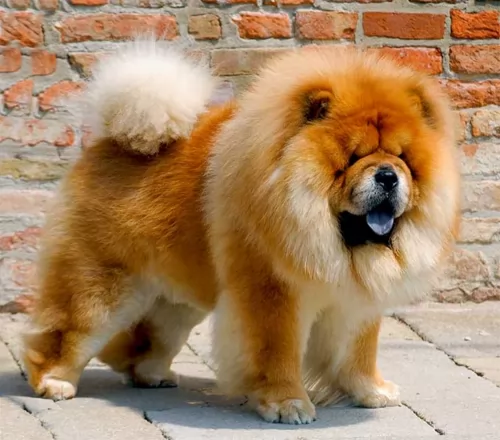 Northern China is the original home of the Chow Chow. In that region of China, the breed was known as the Songshi Quan – “the puffy-lion” dog. They have also been known in China as the “Dog of the Tang Empire” or the Tang Quan. The Chow is believed to be an ancient breed that the Foo Dog, or stone dog guardians of Buddhist palaces and temples, is modeled after. It is one of the most ancient of dog breeds that are still around today.
Northern China is the original home of the Chow Chow. In that region of China, the breed was known as the Songshi Quan – “the puffy-lion” dog. They have also been known in China as the “Dog of the Tang Empire” or the Tang Quan. The Chow is believed to be an ancient breed that the Foo Dog, or stone dog guardians of Buddhist palaces and temples, is modeled after. It is one of the most ancient of dog breeds that are still around today.
It is believed that they have existed for around 2000 years or perhaps even as far back as 3000 years, starting out in Mongolia and migrating to China. The ancientness of the Chow Chow has been validated through DNA testing. In China all those centuries ago, the Chow Chow was born to be a working dog. They hunted, herded, guarded and pulled carts. They went on quests with the Mongolian armies when China was invaded, as well as when the Mongolians invaded the Middle East and Europe later on.
Today’s Canadian Kennel Club has about 350 Chows registered while the AKC gets 10,000 new registrations every year.
The Havapoo is usually a cross with a miniature Poodle and a Havanese but other poodle sizes such as the toy can be used. This is a fairly new cross breed just getting the attention of the American public. The result is a friendly, small dog. They have a striking appearance and lovable personality. They are easy to train and very smart. Not much is know about their heritage except that they were developed in the United States sometime in the past 30 years. Given the long history of the parental breeds, you can count on the quality and beauty of the Havapoo.
Description
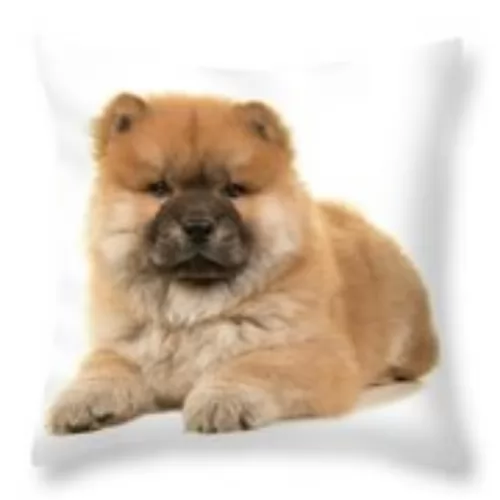 The Chow really does look like a small lion with a black tongue. The dog is sturdy and square with erect, small ears on a broad skull. They have a very dense double coat. Their eyes are deep set and look like almonds, while they all have that very distinctive purple or black tongue. Their lips are also distinctive with their blue color. The nose is black, but some Chows might have a blue nose. The tail is curly.
The Chow really does look like a small lion with a black tongue. The dog is sturdy and square with erect, small ears on a broad skull. They have a very dense double coat. Their eyes are deep set and look like almonds, while they all have that very distinctive purple or black tongue. Their lips are also distinctive with their blue color. The nose is black, but some Chows might have a blue nose. The tail is curly.
These are medium size dogs when it comes to height and weight, but they are powerfully built for their size. Their power is in their compact body holding the energy and strength of a much larger dog. Its hind legs are almost entirely straight, unusual for any dog. They get their lion appearance from the huge ruff that stands behind their heads. Their chest is broad and deep.
The look of the Havapoo is unpredictable in first generation mixes as the puppies can appear like either of the parents. Most however have carried on the facial features of the Havanese. They usually have soft coats with hypoallergenic fur that comes in brown, black, grey, white and tan.
The white dogs tend to be deaf or perhaps even blind.
They are really good looking dogs whichever parent they favor.
Characteristics
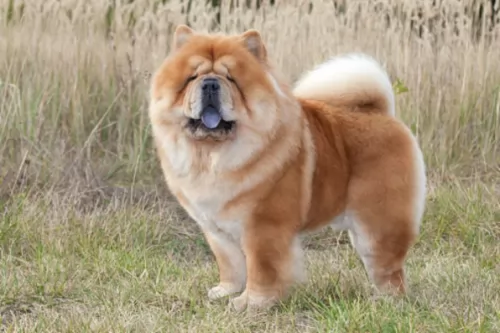 Loyal and true to their family and those they know; the Chow Chow is a little standoffish with strangers. They are very protective and usually attach themselves to one or two people. They are intelligent but stubborn, which can affect your training with them. They need to respect their people and Chows respect hose who take care of them. They can be aggressive toward dogs of their same sex especially if those dogs are the same breed as well.
Loyal and true to their family and those they know; the Chow Chow is a little standoffish with strangers. They are very protective and usually attach themselves to one or two people. They are intelligent but stubborn, which can affect your training with them. They need to respect their people and Chows respect hose who take care of them. They can be aggressive toward dogs of their same sex especially if those dogs are the same breed as well.
They are known to be very clean and many have compared them to cats in that regard. They appear to be dignified and refined. They are usually very quiet but very adaptable dogs.
1Children friendliness yes but monitor their interaction so the dog does not get hurt.
2.Special talents highly intelligent and love to run
3.Adaptability Home or apartment is fine but would love a fenced yard to run in.
4.Learning ability very high smart and loves to learn
Health Problems
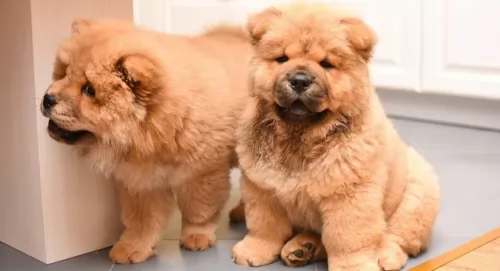 Although an ancient breed that obviously has survived many centuries of trials, the Cho Chow of today is prone to several different health conditions. These include:
Although an ancient breed that obviously has survived many centuries of trials, the Cho Chow of today is prone to several different health conditions. These include:
Eyelid Entropion
This condition can require surgery to keep the turning eyelid from injuring the eye ball.
Hip Dysplasia
This can cause lameness and arthritis.
Elbow Dysplasia
This can cause lameness and arthritis.
Stomach Cancer
Ear Infections
Make sure you keep the ears clean and keep an eye on them.
Even though first generation mixes have no genetic health issues. There are however some issues they are prone to:
• Deafness - primarily in the white dogs, nothing can be done for it.
• Cataracts – can lead to blindness
• Hypothyroidism – can be medicated
• Hip Dysplasia – can lead to lameness
• Patellar Luxation – can lead to lameness
Caring The Pet
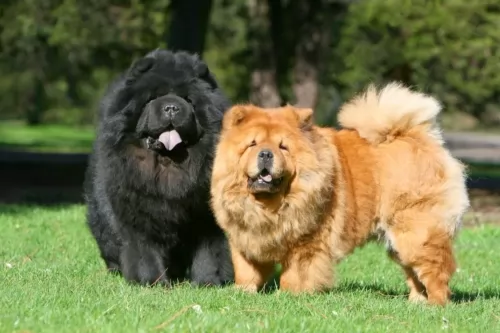 Don’t overfeed a Chow Chow as they are hard workers and big eaters. Feed them at least twice a day.
Don’t overfeed a Chow Chow as they are hard workers and big eaters. Feed them at least twice a day.
Health issues
Additional health issues include:
Glaucoma
This eye disease can lead to blindness if not checked and treated.
Juvenile Cataracts
These can be removed from an adolescent puppy.
Lymphoma
Again, the Chow is susceptible to cancer.
Diabetes
Can lead to heart or kidney problems if left untreated.
Hot Spots/Allergies/Melanoma
Keep a close eye on your Chow Chow skin.
Exercise and games
The Chow Chow was developed as working dog, but today’s version is more laid back and doesn’t need excessive exercise. Daily walks will suffice. They live very happily in the city if walked regularly. They are not really a competitive breed outside of obedience and confirmation. They are seldom seen in sports like agility or frisbee.
1Feeding the puppy – feed a high quality puppy food for small or toy dogs. Feed 3-4 times a day a total or 1 cup.
2.Feeding the adult - feed a high quality puppy food for small or toy dogs. Feed 3-4 times a day a total of 2 cups
3.Points for Good Health – overall good health
4. Games and Exercises – needs some moderate exercise and would love a fenced yard to run in. Will play fetch and some are good at agility.
Comparison with other breeds
- Chow Chow vs English Bulldog - Breed Comparison
- Chow Chow vs German Shepherd - Breed Comparison
- Chow Chow vs Golden Retriever - Breed Comparison
- Chow Chow vs Labrador Retriever - Breed Comparison
- Chow Chow vs West Highland White Terrier - Breed Comparison
- Chow Chow vs French Bulldog - Breed Comparison
- Chow Chow vs Beagle - Breed Comparison
- Chow Chow vs Yorkshire Terrier - Breed Comparison
- Chow Chow vs Poodle - Breed Comparison
- Chow Chow vs Rottweiler - Breed Comparison
- Chow Chow vs Boxer - Breed Comparison
- Chow Chow vs English Pointer - Breed Comparison
- Chow Chow vs Siberian Husky - Breed Comparison
- Chow Chow vs Doberman Pinscher - Breed Comparison
- Chow Chow vs American Bully - Breed Comparison
- Chow Chow vs Abruzzenhund - Breed Comparison
- Chow Chow vs Affenpinscher - Breed Comparison
- Chow Chow vs Afghan Hound - Breed Comparison
- Chow Chow vs Aidi - Breed Comparison
- Chow Chow vs Airedale Terrier - Breed Comparison
- Chow Chow vs Akbash Dog - Breed Comparison
- Chow Chow vs Akita - Breed Comparison
- Chow Chow vs Africanis - Breed Comparison
- Chow Chow vs Askal - Breed Comparison
- Chow Chow vs Atlas Terrier - Breed Comparison
- Havapoo vs English Bulldog - Breed Comparison
- Havapoo vs German Shepherd - Breed Comparison
- Havapoo vs Golden Retriever - Breed Comparison
- Havapoo vs Labrador Retriever - Breed Comparison
- Havapoo vs West Highland White Terrier - Breed Comparison
- Havapoo vs French Bulldog - Breed Comparison
- Havapoo vs Beagle - Breed Comparison
- Havapoo vs Yorkshire Terrier - Breed Comparison
- Havapoo vs Poodle - Breed Comparison
- Havapoo vs Rottweiler - Breed Comparison
- Havapoo vs Boxer - Breed Comparison
- Havapoo vs English Pointer - Breed Comparison
- Havapoo vs Siberian Husky - Breed Comparison
- Havapoo vs Doberman Pinscher - Breed Comparison
- Havapoo vs American Bully - Breed Comparison
- Havapoo vs Abruzzenhund - Breed Comparison
- Havapoo vs Affenpinscher - Breed Comparison
- Havapoo vs Afghan Hound - Breed Comparison
- Havapoo vs Aidi - Breed Comparison
- Havapoo vs Airedale Terrier - Breed Comparison
- Havapoo vs Akbash Dog - Breed Comparison
- Havapoo vs Akita - Breed Comparison
- Havapoo vs Africanis - Breed Comparison
- Havapoo vs Askal - Breed Comparison
- Havapoo vs Atlas Terrier - Breed Comparison
 Petzlover
Petzlover Chow Chow is originated from China but Havapoo is originated from United States. Chow Chow may grow 13 cm / 6 inches higher than Havapoo. Chow Chow may weigh 20 kg / 45 pounds more than Havapoo. Both Chow Chow and Havapoo has almost same life span. Both Chow Chow and Havapoo has almost same litter size. Chow Chow requires High Maintenance. But Havapoo requires Moderate Maintenance
Chow Chow is originated from China but Havapoo is originated from United States. Chow Chow may grow 13 cm / 6 inches higher than Havapoo. Chow Chow may weigh 20 kg / 45 pounds more than Havapoo. Both Chow Chow and Havapoo has almost same life span. Both Chow Chow and Havapoo has almost same litter size. Chow Chow requires High Maintenance. But Havapoo requires Moderate Maintenance Northern China is the original home of the Chow Chow. In that region of China, the breed was known as the Songshi Quan – “the puffy-lion” dog. They have also been known in China as the “Dog of the Tang Empire” or the Tang Quan. The Chow is believed to be an ancient breed that the Foo Dog, or stone dog guardians of Buddhist palaces and temples, is modeled after. It is one of the most ancient of dog breeds that are still around today.
Northern China is the original home of the Chow Chow. In that region of China, the breed was known as the Songshi Quan – “the puffy-lion” dog. They have also been known in China as the “Dog of the Tang Empire” or the Tang Quan. The Chow is believed to be an ancient breed that the Foo Dog, or stone dog guardians of Buddhist palaces and temples, is modeled after. It is one of the most ancient of dog breeds that are still around today. The Chow really does look like a small lion with a black tongue. The dog is sturdy and square with erect, small ears on a broad skull. They have a very dense double coat. Their eyes are deep set and look like almonds, while they all have that very distinctive purple or black tongue. Their lips are also distinctive with their blue color. The nose is black, but some Chows might have a blue nose. The tail is curly.
The Chow really does look like a small lion with a black tongue. The dog is sturdy and square with erect, small ears on a broad skull. They have a very dense double coat. Their eyes are deep set and look like almonds, while they all have that very distinctive purple or black tongue. Their lips are also distinctive with their blue color. The nose is black, but some Chows might have a blue nose. The tail is curly. Loyal and true to their family and those they know; the Chow Chow is a little standoffish with strangers. They are very protective and usually attach themselves to one or two people. They are intelligent but stubborn, which can affect your training with them. They need to respect their people and Chows respect hose who take care of them. They can be aggressive toward dogs of their same sex especially if those dogs are the same breed as well.
Loyal and true to their family and those they know; the Chow Chow is a little standoffish with strangers. They are very protective and usually attach themselves to one or two people. They are intelligent but stubborn, which can affect your training with them. They need to respect their people and Chows respect hose who take care of them. They can be aggressive toward dogs of their same sex especially if those dogs are the same breed as well. Although an ancient breed that obviously has survived many centuries of trials, the Cho Chow of today is prone to several different health conditions. These include:
Although an ancient breed that obviously has survived many centuries of trials, the Cho Chow of today is prone to several different health conditions. These include: Don’t overfeed a Chow Chow as they are hard workers and big eaters. Feed them at least twice a day.
Don’t overfeed a Chow Chow as they are hard workers and big eaters. Feed them at least twice a day.